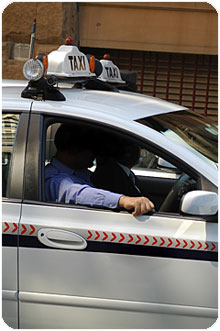There appears to be developing a school of thought to the effect that the “cab-rank” rule should no longer form part of barristers’ ethical rules. I am of the opinion that any such development should be vehemently resisted, largely because the rule provides protection to those litigants who could otherwise be denied representation because they are shunned by society generally.
Statement of the Rule
The cab-rank rule prohibits a barrister from refusing a brief, whether to act as an advocate or to advise, unless the barrister is already professional committed, has not been offered a proper fee, is professionally embarrassed by a prior conflict of interest or lacks sufficient experience or competence to handle the matter. Put another way, if a barrister is available and the brief s/he is offered relates to his or her field of practice and is accompanied by a proper fee, s/he must accepted it.
Hence, barristers must act on a first come, first served basis, just like cab drivers just as a cab driver must drive the next person in line at the rank (hence the reference to the “cab-rank rule”).
This rule is a fundamental rule of the independent Bar.
It has even been suggested that the rule is of such sanctity that it is the barrister’s equivalent of the doctor’s Hippocratic Oath.1
The rule has been judicially stated in various ways:
(a) Brennan J (as he then was) has outlined the rule thus:2
“I would add, obiter, an observation about the duty of counsel to accept any brief which is offered to him or her at a reasonable fee provided it is in a field in which the counsel ordinarily practises and the counsel is not otherwise committed: the “cab-rank” rule.”;
(b) Chief Justice de Jersey has referred to the rule as “…..ethically, barristers are constrained not to choose their clients.”3
Barristers’ Conduct Rules
The Barristers’ Conduct Rules of the Bar Association of Queensland (made pursuant to the Legal Profession Act 2007) provides for the cab-rank principle as follows:4
“Cab-rank principle
21. A barrister must accept a brief from a solicitor to appear before a court in a field in which the barrister practises or professes to practise if:
(a) the brief is within the barrister’s capacity, skill and experience;
(b) the barrister would be available to work as a barrister when the brief would require the barrister to appear or to prepare, and the barrister is not already committed to other professional or personal engagements which may, as a real possibility, prevent the barrister from being able to advance a client’s interests to the best of the barrister’s skill and diligence;
(c) the fee offered on the brief is acceptable to the barrister; and
(d) the barrister is not obliged or permitted to refuse the brief under Rules 95, 97, 98 or 99.
22. A barrister must not set the level of an acceptance fee, for the purposes of Rule 21(c), higher than the barrister would otherwise set if the barrister were willing to accept the brief, with the intent that the solicitor may be deterred from continuing to offer the brief to the barrister.”
Other rules arguably of relevance for present purposes include the following:
“5. These Rules are made in the belief that:
a. barristers owe their paramount duty to the administration of justice;
b. barristers must maintain high standards of professional conduct;
c. barristers as specialist advocates in the administration of justice, must act honestly, fairly, skilfully and with competence and diligence;
d. barristers owe duties to the courts, to their clients and to their barrister and solicitor colleagues…….
12. A barrister must not engage in conduct which is:
a. dishonest or otherwise discreditable to a barrister;
b. prejudicial to the administration of justice; or
c. likely to diminish public confidence in the legal profession or the administration of justice or otherwise bring the legal profession into disrepute.
25. A barrister has an overriding duty to the Court to act with independence in the interests of the administration of justice.”
As can be seen, while these rules are largely comprised of broad statements of objectives and principles, they do contain some specific prohibitions on certain conduct.
However, because the rules do not codify a barrister’s duties, reliance must also be had to the common law.
Rationale Behind the Rule
 The cab-rank rule:
The cab-rank rule:
(a) Ensures that ALL litigants are able to obtain the services of a barrister;
(b) Protects barristers from any adverse consequences that could arise from accepting a particular brief.
The rationale behind the cab-rank rule is that the legal profession has an obligation to provide legal services to ALL who are in need of those services. However, if barristers are permitted to pick and choose their clients, there is a real danger that some people will simply be unable to obtain appropriate legal representation.
Brennan J has outlined the importance of the rule thus:5
“Whatever the origin of the rule, its observance is essential to the availability of justice according to law. It is difficult enough to ensure that justice according to law is generally available; it is unacceptable that the privileges of legal representation should be available only according to the predilections of counsel or only on the payment of extravagant fees. If access to legal representation before the courts were dependent on counsel’s predilections as to the acceptability of the cause or the munificence of the client, it would be difficult to bring unpopular causes to court and the profession would become the puppet of the powerful.”
Arguments Against the Rule
The principle reasons advanced for abandoning the cab-rank rule appear to include the following:
(1) There are so many exceptions to the rule that it is, in effect, impossible to enforce;
(2) The rule could be abused by wealthy clients who have the ability to tie up all of the best barristers with experience in a particular area;
(3) Unlike cab drivers, barristers must establish with their clients a relationship based on trust; and
(4) The rule does not apply to solicitors.
The argument that the cab-rank rule should no longer exist because there are so many exceptions to the rule means that it is impossible to enforce does not withstand scrutiny. It is acknowledged that there are many exceptions to the rule, including the fact that a barrister is otherwise engaged or too busy to accept the brief on offer (or will be taking leave during the period in question!). However, the mere fact that there are many ways to subvert the operation of a rule in general, or the cab-rank rule in particular, should not be reason for abandoning it, nor should the fact that the rule is often broken or not adhered to. Many of the rules in the Barristers’ Conduct Rules of the Bar Association of Queensland6 can be subverted without any real likelihood of penalty, but that does not mean that those rules should be abandoned.
The argument that the cab-rank rule may be abused by wealthy clients able to tie up all of the best barristers with experience in a particular area by, for example, being the first to brief all of the best barristers with experience in a particular area cannot be a valid argument today because the competition between barristers is now so much greater than was the case. There are now thousands of barristers practising throughout Australia with a right to appear throughout the whole of Australia (unlike, for example, the situation in Queensland before Street v Queensland Bar Association7 before which a barrister not resident in Queensland could appear as a barrister in Queensland). Further, unusual and extreme events should not be allowed to play a disproportion role in enforcing necessary standards of conduct.
It is also submitted that the argument that the rule should not apply to barrister because, unlike cab-drivers, barrister must establish with their clients a relationship based on trust is not a valid argument. If the client lies to the barrister and to the court, or otherwise behaves in a way that reflects adversely upon the client, such behaviour does damage to the client but not to the barrister. While the client must trust the barrister, the barrister need not trust the client. That the issue of client trust is not a particularly important one is highlighted by the fact that it is not at all unusual for barristers to know nothing about the character of the potential client before acting for that client.
A further argument against the cab-rank rule is that it does not apply to solicitors. However, the rationale for the rule does not have the same application to solicitors because there are considerably more solicitors in practice than barristers with the result that the importance of the application of the rule to solicitors is not as great. Further, the cab-rank rule does in fact have some application to solicitors because solicitors often use the rationale underpinning the cab-rank rule as protection against potential and unfounded criticism of the solicitor for acting on behalf of clients who are condemned by society. If solicitors did not have such protection, there is a real chance that solicitors acting on behalf of certain clients could be the subject of adverse criticism with the result that such clients might find it difficult to find a solicitor willing to act on their behalf.
Arguments in Favour of the Rule
As outlined above, the purpose of the cab-rank rule is to ensure that no one appearing before a court is denied competent representation, no matter how vile the crime charged or how unpopular or outrageous the conduct or views in issue.
The strongest argument in support of the cab-rank rule is that without it many persons may be required to appear in court without competent legal representation. This would normally be the case with people who have most at stake, such as persons who have allegedly committed heinous acts such as notorious murders (for example, Martin Bryant, who was convicted of killing 35 people in Port Arthur in 1996, or Lindy and Michael Chamberlain), or rapes, particularly those involving violence and depravity (for example, the Muslim man charged with a highly publicised gang rape of a young defenceless girl), odious litigants in unpopular civil litigation or dissidents suing governments. To this list today may be added the asylum-seeker, the alleged terrorist, the alleged “people smuggler”, the corporate litigant defending allegations of improper behaviour in selling dangerous medicines that have caused much misery or even those cigarette companies defending proceedings brought by persons dying an agonising death as a result of lung cancer. And what of the scarred Aboriginal woman who has killed her partner after many years of severe beatings?
Such unpopular defendants are often those most in need of competent legal representation. The higher the stakes, the greater the need for good representation.
There is a real likelihood that if the cab-rank rule does not apply, barristers could pick and choose their clients and this could result in persons facing particularly serious allegations being required to answer those allegations without representation by a competent and experienced barrister.
The cab-rank rule also provides a protection for those barristers who appear on behalf of persons who are otherwise condemned by society:
(a) The rule protects barristers from the obloquy which could otherwise attend appearing for those charged with heinous offences;
(b) The rule insulates barristers from the criticism that they do not appreciate that the alleged behaviour of the client deserves condemnation by the whole of society;
(c) The rule prevents barristers from being seen by the public and/or professional colleagues as somehow expressing sympathy for the client’s alleged behaviour;
(d) The rule forces otherwise reluctant barristers to accept unpopular cases and it reduces the chance of valid and informed criticism of barristers who appear in such cases.
Conclusion
 I am of the opinion that the duty of professional associations such as the Bar Association of Queensland is to ensure the maintenance of the cab-rank rule. This duty has been very well summarised by Brennan J thus:8
I am of the opinion that the duty of professional associations such as the Bar Association of Queensland is to ensure the maintenance of the cab-rank rule. This duty has been very well summarised by Brennan J thus:8
“If the cab-rank rule be in decline – and I do not know that it is – it would be the duty of the leaders of the Bar and of the professional associations to ensure its restoration to full vigour.”
I believe the cab-rank rule is too important to be omitted from our ethical rules.
The more heinous and depraved the alleged acts, the more reason to provide representation. After all, our society is best judged by the manner in which we treat the most vulnerable members of our society. If barristers represent those charged with the worst type of offences, everyone else can be assured of receiving the assistance they deserve. However, if the judicial system permits value judgements as to who is entitled to receive adequate representation, the whole judicial system begins to disintegrate.
The obligation to undertake the “unpopular cases” goes beyond our professional ethical rules – it is tied to the fundamental workings of our judicial system. The failure of barristers to stand between the most needy clients and the power of the state with all of its resources puts the legitimacy of our entire judicial system at risk. We cannot afford to introduce into our judicial system a subjective value judgment as to who is deserving of representation because such a system does not represent real justice to all.
Dan O’Gorman S.C.
Footnotes
- A Thornton, “The Professional Responsibility and Ethics of the English Bar” in R Cranston, ed,. Legal Ethics and Professional Responsibility, Oxford: Clarendon Press 1995, at 68.
- Giannarelli v Wraith (1988) 165 CLR 543 at 580.
- de Jersey, The Honourable Chief Justice Paul AC “Owed on a Grecian Earn (Speech delivered at the 8th Greek/Australian International Legal and Medical Conference, Corfu, Greece, 6 June 2001)” (QSC) [2001] QldJSchol 31; de Jersey, The Honourable Chief Justice Paul AC “Public professions: liabilities and immunities (Speech delivered at the Cardiologists Seminar, Surfers Paradise, Gold Coast, 17 February 2001)” (QSC) [2001] QldJ Schol 7.
- Rules 21 and 22.
- Giannarelli v Wraith (1988) 165 CLR 543 at 580.
- 23 December 2011.
- (1989) 168 CLR 461.
- Giannarelli v Wraith (1988) 165 CLR 543 at 580.




 The cab-rank rule:
The cab-rank rule: I am of the opinion that the duty of professional associations such as the Bar Association of Queensland is to ensure the maintenance of the cab-rank rule. This duty has been very well summarised by Brennan J thus:
I am of the opinion that the duty of professional associations such as the Bar Association of Queensland is to ensure the maintenance of the cab-rank rule. This duty has been very well summarised by Brennan J thus: